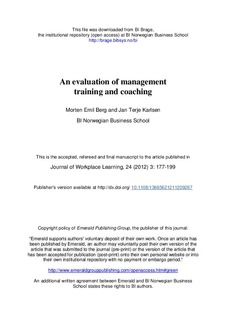| dc.description.abstract | PURPOSE: The focus of this paper is on management training and development. The purpose has been to address how coaching can be applied to learn about leadership tools and what effect this has on management behaviour and development.
METHODOLOGY: This is a qualitative case study of a management development program. The empirical data were obtained using in-depth interviews, surveys, and observations. In addition to investigating the 14 participants, data were also collected from their superiors and subordinates.
FINDINGS: One of the main findings is that coaching is a helpful training process to learn about the manager’s toolbox and to develop new management behavior. Furthermore, data revealed that the management training should be based on the specific work challenges that the participants experience at their workplace. Based on a variety of work challenges, the participants highlighted the following tools as most important: Emotional intelligence, empowerment, self-management, signature-strengths, and positive emotions.
LIMITATIONS: Future research should apply a more comprehensive research design, for example, using a control group.
IMPLICATIONS: Data analysis shows that coaching is a management training process where the participants can learn to solve real work challenges. By trial and testing at their own workplace, managers learn how to use appropriate tools and change their behaviour. As part of the learning process we recommend debriefing where the managers can get feedback and inspiration for self-reflection. Furthermore, through team and peer coaching, the managers can help each other learn. We also recommend that the participant’s superiors and subordinates should be involved in the training process.
ORIGINALITY: In this research we have studied coaching as a learning and training method applying leadership tools. | nb_NO |
